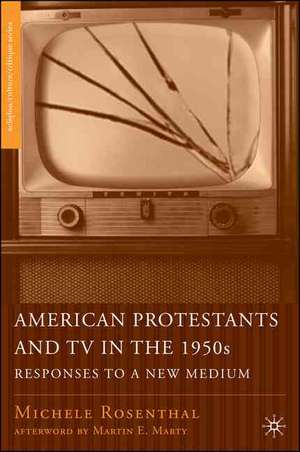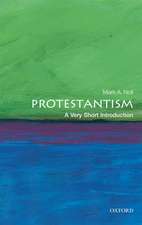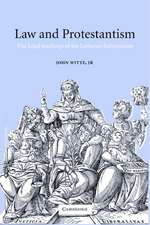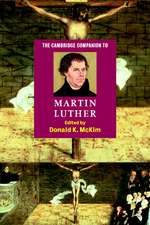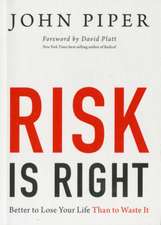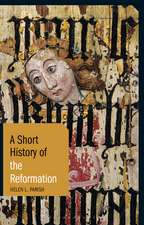American Protestants and TV in the 1950s: Responses to a New Medium: Religion/Culture/Critique
Autor M. Rosenthal Contribuţii de Kenneth A. Loparoen Limba Engleză Hardback – 9 apr 2008
| Toate formatele și edițiile | Preț | Express |
|---|---|---|
| Paperback (1) | 381.00 lei 6-8 săpt. | |
| Palgrave Macmillan US – 9 apr 2008 | 381.00 lei 6-8 săpt. | |
| Hardback (1) | 384.48 lei 6-8 săpt. | |
| Palgrave Macmillan US – 9 apr 2008 | 384.48 lei 6-8 săpt. |
Preț: 384.48 lei
Nou
Puncte Express: 577
Preț estimativ în valută:
73.57€ • 76.81$ • 60.89£
73.57€ • 76.81$ • 60.89£
Carte tipărită la comandă
Livrare economică 04-18 aprilie
Preluare comenzi: 021 569.72.76
Specificații
ISBN-13: 9781403965738
ISBN-10: 1403965730
Pagini: 179
Ilustrații: XII, 179 p.
Dimensiuni: 140 x 216 x 17 mm
Greutate: 0.33 kg
Ediția:2007
Editura: Palgrave Macmillan US
Colecția Palgrave Macmillan
Seria Religion/Culture/Critique
Locul publicării:New York, United States
ISBN-10: 1403965730
Pagini: 179
Ilustrații: XII, 179 p.
Dimensiuni: 140 x 216 x 17 mm
Greutate: 0.33 kg
Ediția:2007
Editura: Palgrave Macmillan US
Colecția Palgrave Macmillan
Seria Religion/Culture/Critique
Locul publicării:New York, United States
Cuprins
American Protestantism and the Television: Toward a Dialogical Approach to Media, Religion, and Culture "Turn It Off!:" The Liberal Protestant Critique of Television Mainline Religious Broadcasting: A Failure? Television and the Construction of Evangelical Identity "The Age of Space Requires Space Age Teaching Tools:" Technology on Evangelical Terms Epilogue: Protestants in the Age of Electronic Media
Recenzii
"Why are evangelicals early adopters of new media technology while the
Protestant mainline responds ambivalently to innovations in mass communications? Rosenthal analyzes the nexus of technology, faith, and culture to answer key questions in the emerging field of religion and media studies. Her book extends previous scholarship on religion and television through in-depth case studies of how American religious groups responded to the potential of a new medium for outreach." - Diane Winston, Knight Chair in Media and Religion, Annenberg School for Communication, University of Southern California
"Rosenthal's outstanding account fills a long-standing gap in our understanding of American media history. The new medium of television posed a perceived threat to the authority of the Protestant establishment in education, politics, and the domestic sphere. The reaction Rosenthal details tells us much about the place of Protestantism in the culture in the mid-twentieth century and much about how the media age has de-stabilized and re-structured religion and religious institutions. This excellent history provides fascinating and telling insights into the ways that these institutions saw themselves and this new medium. Their perception of threats to institutional authority and to domestic values posed by television continues to echo across debates over the role of media in the U.S. An invaluable resource to scholars and educators in religious studies, religious history, media studies, media history, and media policy." - Stewart M. Hoover, Professor, School of Journalism and Mass Communication and Director, Center for Media, Religion, and Culture, University of Colorado
"In this engaging and accessible book, Rosenthal studies American Protestants at mid-century - then the clear leader in the realm of religious influence on American politics - to learn why they were so skittish about television, and how that contributed to the rise of evangelicalism s power in the U.S. This is a provocative look at a previously untold story, and anyone who wonders about how U.S. religion came into its current configuration in public life needs to read this book." - Lynn Schofield Clark, author of From Angels to Aliens
Protestant mainline responds ambivalently to innovations in mass communications? Rosenthal analyzes the nexus of technology, faith, and culture to answer key questions in the emerging field of religion and media studies. Her book extends previous scholarship on religion and television through in-depth case studies of how American religious groups responded to the potential of a new medium for outreach." - Diane Winston, Knight Chair in Media and Religion, Annenberg School for Communication, University of Southern California
"Rosenthal's outstanding account fills a long-standing gap in our understanding of American media history. The new medium of television posed a perceived threat to the authority of the Protestant establishment in education, politics, and the domestic sphere. The reaction Rosenthal details tells us much about the place of Protestantism in the culture in the mid-twentieth century and much about how the media age has de-stabilized and re-structured religion and religious institutions. This excellent history provides fascinating and telling insights into the ways that these institutions saw themselves and this new medium. Their perception of threats to institutional authority and to domestic values posed by television continues to echo across debates over the role of media in the U.S. An invaluable resource to scholars and educators in religious studies, religious history, media studies, media history, and media policy." - Stewart M. Hoover, Professor, School of Journalism and Mass Communication and Director, Center for Media, Religion, and Culture, University of Colorado
"In this engaging and accessible book, Rosenthal studies American Protestants at mid-century - then the clear leader in the realm of religious influence on American politics - to learn why they were so skittish about television, and how that contributed to the rise of evangelicalism s power in the U.S. This is a provocative look at a previously untold story, and anyone who wonders about how U.S. religion came into its current configuration in public life needs to read this book." - Lynn Schofield Clark, author of From Angels to Aliens
Notă biografică
MICHELE ROSENTHAL is Professor in the Department of Communication at the University of Haifa, Israel.
